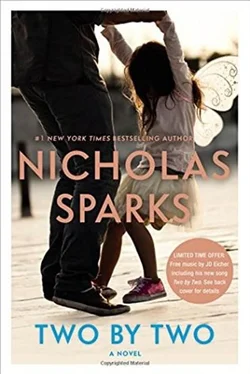Had there ever been anything humorous said in this room? Did any patients ever laugh when talking to their oncologist? Could any joke minimize the horror of what was happening?
To us, Marge appeared to be improving slightly-she’d had more energy since the holidays, and her pain didn’t seem quite as acute. Even her breathing seemed less labored. All of that should have pointed to good news. I could see the hopefulness in my parents’ expressions; I noted the confident way Liz was holding Marge’s hand. We’d shared our secret hopes amongst ourselves during the previous week, trying to draw strength from each other.
Marge, however, didn’t look hopeful. There was an air of resignation about her from the moment she took her seat, and I knew right then, with certainty, that Marge would be the only one who wouldn’t shed a tear that afternoon. While the rest of us had remained stuck in various stages of grief-denial, anger, bargaining, depression-Marge alone had already moved on to acceptance.
Marge knew-even before the doctor said a single word-that the cancer hadn’t slowed its progression. In truth, she’d known all along that it had spread even farther.

“Please don’t ask me how I’m doing,” Marge said. “Mom and Dad just left, and Mom kept asking me that over and over. And Dad keeps asking what else needs to be fixed. I wanted to say me , but didn’t think they could handle the joke.” We were sitting on Marge’s sofa, as had become our custom, staring at the empty space where the Christmas tree had once stood. My dad had removed it a few days earlier, but the furniture hadn’t been rearranged yet, leaving a barren space in the corner of the room.
“It’s a hard day for them,” I said. “They’re doing their best.”
“I know,” Marge said. “And I love that Dad keeps coming around. We’ve talked more than we have in years, and not just about baseball.” She let out a breath before suddenly wincing. A wave of pain-somewhere, everywhere-made her entire body tighten before it finally passed.
“Can I get you something?” I asked, feeling more helpless than ever.
“I just took a pill,” she said. “I don’t mind the painkillers, other than that they make me sleepy. They don’t work as well as I want them to, of course. They blunt the pain a bit, but that’s about it. Anyway…” She looked toward the kitchen, where Liz was at the table, coloring with London. Lowering her voice, she said, “I told Liz I’m not doing another round of chemo.” Her expression was grim, but resolute. “She was pretty upset about it.”
“She’s just scared,” I said. “But do you really think that’s the right decision?”
“You heard the doctor,” she countered. “It’s not working. And on the downside, it makes me feel even worse. All I do is vomit and sleep, and my hair is starting to fall out. I’m losing whole days after the treatment, and I don’t have that many days left.”
“Don’t say that,” I pleaded.
“I’m sorry. I know you don’t want to hear it. Nobody does.” Marge squeezed her eyes shut, wincing again at another wave of pain that, to me, took far too long to pass. “I’m guessing London doesn’t know I’m sick, am I right?”
I shook my head. “She doesn’t even know that Vivian and I are getting divorced yet.”
Marge opened one eye to peer at me. “It’s probably time that you tell her, don’t you think?”
I didn’t answer, because I didn’t even know where to start. There was too much to lay on a six-year-old: divorce and Marge dying and moving-maybe even as far away as Atlanta-leaving her father and her friends behind.
I didn’t want London to deal with any of it. I didn’t even want to deal with it. As I felt the tears building behind my eyes, Marge reached over and placed her hand on mine. “It’s okay,” she soothed.
“No, it’s not okay. None of this is okay.” I could hear my voice begin to crack. “What am I going to do about London? What am I going to do about you?”
She squeezed my hand. “I’ll talk to London about me, okay? So don’t worry about that. It’s something I’ve been wanting to do. As for everything else, I’ve already told you what I think.”
“What if I can’t? What if I let you down?”
“You won’t,” she said.
“You can’t know that.”
“Yes, I can. I believe in you.”
“Why?”
“Because,” she said, “I know you better than anyone. Just like you know me.”

The following Friday, in mid-January, Vivian flew into town to pick up London for the weekend. When I broached the idea that it was probably time to tell London about our impending divorce, she suggested that we do it when they got back. After all, she said, she didn’t want to ruin London’s weekend.
The next morning, my Realtor staged our first open house, and as promised, Marge and Liz were there, loudly talking up the house to each other in front of potential buyers. Afterward, my Realtor called to tell me that she’d detected some genuine interest in the property from one couple in particular, who were relocating with their children from Louisville.
“By the way, your sister missed her calling as an actress,” the Realtor remarked.
On Sunday evening, shortly after their return from Atlanta, Vivian and I sat our daughter down at the kitchen table and gently broke the news.
We kept the discussion at a level appropriate for a six-year-old, emphasizing that both of us still loved her and that we would always be her parents. We told her that she had nothing to do with the fact that we could no longer stay married.
As she’d done the first time, Vivian led the discussion. Her demeanor was loving and I felt that she struck the right tone, but London burst into tears nonetheless. Vivian held her and kissed her as she cried.
“I don’t want you to get divorced,” London pleaded.
“I know it’s hard, sweetheart, and we’re so sorry.”
“Why can’t you just be happy with each other?” London said, still sobbing. Her naïve incomprehension triggered such a profound wave of guilt that I despised myself.
“Sometimes it just doesn’t work,” I tried to explain. The words sounded meaningless, even to me.
“Is that why the house is for sale?”
“I’m afraid so, baby girl.”
“Where am I going to live?”
At her question, my eyes flashed toward Vivian, silently warning her not to say Atlanta . Her expression was defiant, but she held her tongue.
I put a hand on London’s back. “We’re still working on that. And I promise that no matter what happens, your mom and I will both be around to take care of you.”
Eventually, London calmed down, though she was clearly still confused and shaken. Vivian went upstairs with her and started getting her ready for bed. When she came back down, I intercepted her at the door.
“How is she?” I asked.
“She’s upset,” Vivian answered, “but according to my counselor, that’s normal. In the long run, she’ll be fine as long as you don’t make the divorce more acrimonious than it has to be. That’s when kids suffer the most in these situations, and you don’t want to do that to her.”
I bit back a retort-I wasn’t the one making this acrimonious, after all-knowing it was pointless.
Vivian gathered her things-the limo and the jet were waiting, after all-but she paused in the doorway. “I know it’s a bad time, with Marge and everything,” she said, “but we need to get our agreement squared away sooner rather than later. You just need to sign it, so we can be done with all this.” And then she was gone.
Читать дальше














